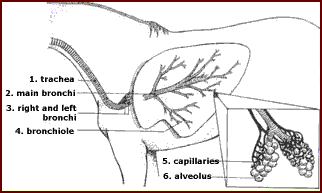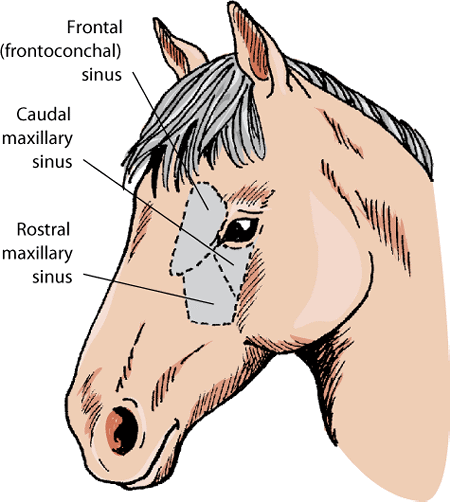Similar to human respiratory health, laboured breathing in horses (dyspnoea) may be caused by the constriction of the innumerable air tubes in the lungs (the bronchii). This is more commonly known as Asthma, which may be allergic or non-allergic in origin.
Other forms of laboured breathing may be due to heart problems and degeneration of elastic fibres in the lungs.
Some of the most common causes of coughing and the identifying factors in horses:
- Bacterial Infection
- Cold-Weather Cough
- Common Cough
- Common Cold
- Dust-Induced Cough
- Foreign Object
- Heaves
- Inflammatory Airway Disease
- Lungworms
- SinusitisTracheo Bronchitis
- Viral Infection
- “Warm-Up” Cough
EquiHealth can assist in clearing up the underlying cause of any of these types of cough, along with helping to reduce the cough, and other, symptoms. Regular use may also help to prevent these underlying causes and symptoms from occurring.
Here are those causes in a little more detail…
Bacterial Infection
There are, of course, many types of bacterium, and therefore symptoms may differ according to each strain.
This type of infection can cause an intermittent wet cough, often accompanied by a noticeably thick nasal discharge. Also present may be a fever, loss of appetite, and lethargy.
Your horse may have enlarged lymph nodes under the jaw (strangles).
EquiHealth application could benefit the horse by providing a means of helping the body to fight infection, and speed up the healing time.

Cold Weather-Induced Cough
This type of cough usually occurs when a horse is being exercised, in cold weather!
After initial coughing, the horse is usually fine, just susceptible to the sensitivity of coughing from damp air.
Micro-Current Acupressure helps to boost the horse’s respiratory strength and immunity to prevent over sensitivity. It could also help to resolve imbalances related to cold-weather sensitivity.
Common Cough
A common cause of coughing is influenza. This is highly infectious but recovery is usually straightforward.
To help prevent susceptibility to illness and debilitation from influenza virus, you could use EquiHealth on your horse to improve overall strength and wellbeing, concentrating on the stimulation points of the respiratory tract, and ear, nose, and throat.
Common Cold – Nasal Discharge
The common cold is not a disease of the horse. Strangles is an infectious cause of nasal discharge. The symptoms of Strangles include swollen throat and nasal discharge. There are other causes.
Dust-Induced (Arena Cough)
This type of cough is more common in the winter months. The horse coughs initially when being ridden in an arena and then appears fine. The horse is usually otherwise healthy.
Foreign Object
(This doesn’t include choking, which should be treated as a medical emergency)
This will sound an odd, non-resolving cough.
The horse may hold their head or neck in strange positions, and appear uncomfortable. The object lodged in the larynx, or further down, may be dislodged with coughing, but veterinary intervention may be necessary.
Recurrent Airway Obstruction (Heaves)
This is a chronic wet cough, which is often more noticeable when eating, when in the barn environment, or when being exercised.
The horse will likely have increased respiration and flared nostrils as well.
This is more common in middle-aged and older horses.
Coughing may be less apparent when horse is on pasture.
This is often due to general weakness in the respiratory, circulatory, and digestive systems. These work together, and malfunction or weakness can be due to a disorder or deficiency in any one of them. EquiHealth, practiced regularly for general fitness, or specifically on a course for a particular known weak area, could benefit the horse in strengthening their system to fight infection and disease.
Inflammatory Airway Disease
This condition is a chronic, intermittent cough, occurring more commonly in younger and sometimes middle-aged horses (especially race horses).
It may be accompanied by a nasal discharge.
If a performance horse, they will likely exhibit a decreased competency.
Lungworms
Lungworm isn’t common, but is still useful to include here.
It consists of an intermittent coughing that is made worse with exercise.
It is really more common in donkeys, or if found in horses, it is usually seen in horses that are put out to pasture with donkeys.
Sinusitis – Nasal Blockage or Discharge
The horse has 3 pairs of cavities, or sinuses. These are openings into the nasal cavity, which together are voluminous.
With this being down to an immunity issue, the immune system points would be concentrated upon. In addition, attention paid to the stimulation pathways of the specific sinuses, as well as the respiratory and circulatory systems as a whole.
Tracheo Bronchitis
There are several causes of inflammation of the wind pipe (trachea), and larger bronchi. These include dust, emphysema (broken wind), and infections.
Viral Infection
This may appear as a frequent, dry cough, often accompanied by watery nasal discharge, fever, lethargy, and loss of appetite.
“Warm-Up” Cough
The Horse will usually appear healthy, but will cough when being warmed up for exercise. After the initial coughing, the horse is normally absolutely fine.
This is thought to likely be caused by an excessive mucous accumulation.


Recent Comments